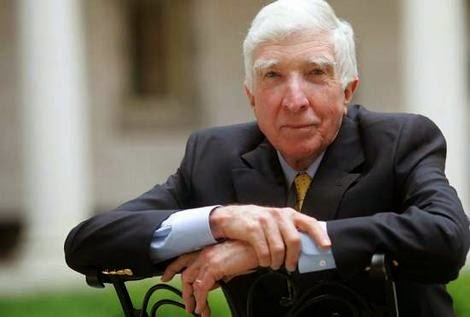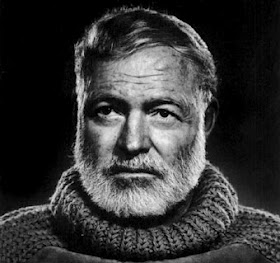Robert Frost
BIOGRAPHY
Robert Frost: The Man and His Work - 1923
"Sometimes I have my doubts of words altogether, and I ask myself what is the place of them. They are worse than nothing unless they do something; unless they amount to deeds, as in ultimatums or battle-cries. They must be flat and final like the show-down in poker, from which there is no appeal. My definition of poetry (if I were forced to give one) would be this: words that become deeds."
"All poetry is a reproduction of the tones of actual speech."
"There are two types of realists: the one who offers a good deal of dirt with his potato to show that it is a real one, and the one who is satisfied with the potato brushed clean. I'm inclined to be the second kind. To me, the thing that art does for life is to clean it, to strip it to form"
"A poem begins with a lump in the throat; a home-sickness or a love-sickness. It is a reaching-out toward expression; an effort to find fulfillment. A complete poem is one where an emotion has found its thought and the thought has found the words."
Stopping By Woods on a Snowy Evening
Listen:
When asked to reveal the hidden meaning of his poems, Robert Frost's response was "If I wanted you to know I'd had told you in the poem." Born in San Francisco in 1874, Frost spent his early childhood in California, then moved to Massachusetts at the age of 11, following the death of his father. He spent much of the rest of his life in New England. Frost taught at a number of New England institutions to support himself and his family; but his true passion was writing. He once said that he wanted to write, "a few poems it will be hard to get rid of." Frost wrote one of his most famous poems, "Stopping by Woods on a Snowy Evening," at his home in Shaftsbury, Vermont in 1922. It was published the following year in a volume of poems called New Hampshire, which earned Frost one of the four Pulitzer Prizes he would receive in his lifetime. This clip came from a 1958 film shot at Frost's farmhouse in Vermont. In addition to reading two poems in the film, Frost also recalls personal experiences—as a mill worker, cobbler, and farmer—that helped inspire his poetry.
Assignment
1. Comment
on the title of the
verse.
2.
State the main idea of the verse.
II. Comment
on the poetic features of the text.
a)
rhythmical;
b) lexical;
c)
stylistic.
III. Speak
about the vocabulary of the verse, its morphological, semantic and poetic
features.
IV. State
the grammar forms in the verse and comment on their stylistic value.
V. Pick out
and give examples of a peculiar kind of a rhythmical poetry based on
reiteration of words and phrases. Say why they bring forth unexpected semantic
effects. Don't forget about intensifiers "but", "and".
VI. Comment
on detached epithets describing woods (lines 4, 13) farmhouse, line 6),
promises (line 14) and miles (lines 15, 16). State their stylistic value.
VII. Speak
about object-images in the verse:
1 . Give
examples of metaphors, similes, repetitions in which the following associations
are made: flakes, the wind, the horse, the only other sound, he and his, I
sleep.
2. Say what
connotations the words "sweep", "queer". "stop",
"sleep" have for you.
3. Give
examples of personification and exaggeration (hyperbole).
VIII.
Comment on the devices which help to produce the musical effect and sometimes
onomatopoetic-imitating sounds of nature:
a)
alliteration in sounds and phrases;
b)
punctuation in pair-rhymed lines, run-on lines, end-stopped lines.
IX.
Characterize the key of the verse as lyrical, dramatic, epic or grotesque. Comment
on your choice.
X.
Determine the tonal message of the verse as genial, sad, lyrical or ironic. Say
why.
XI.
Summarizing your analysis don't forget to add:
- what you think the poet's
purpose is describing this scene; what the author is trying to help us
imagine; what you think about the poet's message; if it is cognitive,
informative or puzzling;
- how you understand the poet's
symbolic representation and what it adds to the verse;
- what feelings this poem
communicates to you. Are they named or expressed indirectly;
- what physical details are
selected to suggest precise secondary meaning;
- which of the five senses
(touch, taste, smell, hearing, sight) are exercised by the readers;
- that the poem was highly
appreciated for its remarkable optimistic power and was awarded the
Pulitzer prize.
Questions
1. Why do you think Frost uses the word
"woods" instead of "forest"? How are these two words
different from one another?
2. Why does our speaker worry so much
about who owns the woods?
3. Many people have criticized Frost
for being too concerned with the past or with things that have nothing to do
with the modern world (like radios and TV). Do you agree with this
criticism? Can you relate to this poem?
4. Why do you think Frost titled this
poem "Stopping by Woods on a Snowy Evening?"
You can find a lot of useful information about how to read poetry in my earlier posts. Here's some links to R.Frost's poem "Stopping by Woods".
Study Guide
Rhyme, Form & Meter
ANALYSIS
Analysis 1
Analysis 2
Questions
1. What type of choices do you think this fork in the road represents for the speaker?
2. Do you think the road the speaker took was really the less traveled one? Why?
3. What do you think the chances are that the speaker will get to come back and try the other path?
4. Do you think the speaker regrets his choice, or is happy about it? Why?
5. What personal choices does this poem remind you of?


.jpg)


Comments
Post a Comment